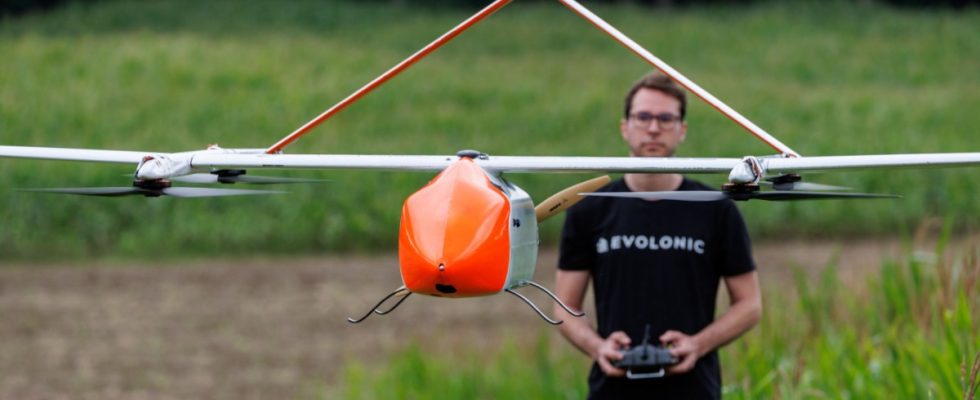The weather doesn’t quite suit the occasion. Luckily, one has to say in this case, it’s about forest fires on this rainy Wednesday at the main fire station in Erlangen. To be more precise: their early detection. Interior Minister Joachim Herrmann (CSU) has come, Erlangen’s Lord Mayor Florian Janik (SPD) and members of Evolonic, a group of around 20 students who have developed special reconnaissance drones for this purpose – and present them at the fire station.
“There is hardly a topic that is more topical,” says its director Friedhelm Weidinger. Yes, it’s raining today. But you only have to think back four weeks. It was hot in Germany then. It burned in southern Europe, especially in Greece. In addition, the devastating fires in Saxon Switzerland last year. In other words: the rain is deceptive.
“Forest fires are also spreading in Germany, we have to deal with them,” says Joachim Herrmann, whom they call “our fire brigade minister” here. There were around 100 forest fire operations in Bavaria in 2022. It will hardly be less in the future. Because, and Herrmann repeats this number: Two-thirds of Bavaria consists of forest. And this forest is drying up. Which increases the risk of fire alongside rising temperatures and prolonged periods of drought.
Birgit Süssner, the forest fire expert at the Erlangen fire brigade, has prepared figures: In 2018, 2,349 hectares of forest burned in Germany, at that time the highest value in 26 years. Last year it was around 3058 hectares. The Nuremberg, Erlangen and Fürth region is particularly at risk.
In the fight, everyone in the hall with the fire-fighting vehicles emphasizes that early detection of the fire is crucial. And best of all: an even earlier one. So far, the tower at Nuremberg Airport and landing and taking-off aircraft have helped, explains Friedhelm Weidinger. As soon as an increased warning level is reached, so-called air observers would be deployed on control flights. Interior Minister Herrmann also refers to pilots of private planes who received compensation for reconnaissance flights.
If everything goes as outlined that day, these control flights will be taken over by the drones developed by students from the Friedrich-Alexander University Nuremberg Erlangen (FAU) together with the Fraunhofer Institute for Integrated Systems and Device Technology IISB. The gray aircraft with the bright orange nose weighs almost ten kilograms and is about three by three meters in size. The drones can stay in the air for up to an hour and cover a distance of up to 100 kilometers – usually at a height of 100 to 120 meters. Then they automatically fly to a charging station to get ready for the next of up to five flights a day.
In order to prevent major damage, it is important to discover forest fires – such as in June in Lower Franconia – as quickly as possible. Students have now developed a drone for this purpose.
(Photo: Ralf Hettler/dpa)
A software specially developed by the students recognizes smoke in the forest using artificial intelligence. As soon as this has happened, the drone automatically triggers an alarm and transmits both GPS coordinates and image material to the fire brigade. Instead of rough descriptions from forest walkers about possible fires, they can quickly decide on the basis of live images: forest fire? Or barbecue party? big operation? Or done quickly?
The drone also records temperature, humidity, wind speed – all indicators of how quickly a fire can spread. In addition, the software developed by Evolonic makes the forest roads visible so that the fire brigade knows which vehicles are the quickest to get to the source of the fire and which route to take. “This is a new dimension,” says Interior Minister Herrmann.
First of all, test flights from a field in nearby Möhrendorf are scheduled for this month in a pilot project with the Erlangen fire brigade. Incidentally, if the three prototypes should discover fire during their flights over the state forest Mark, these findings could already be used now. In two years, the drone inventors want to monitor 80 square kilometers in Bavaria’s forests. Evolonic needs 500,000 euros for the further development from test to regular operation, and the company bosses are hoping for help from the Free State. And he is “confident in the person of the interior minister. I think we can do that,” says Herrmann when asked by the SZ.

